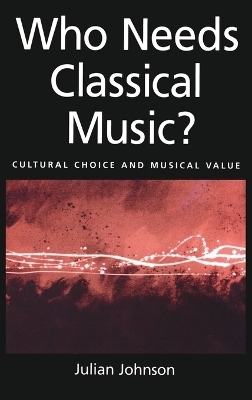
Who Needs Classical Music?
Cultural Choice and Musical Values
Seiten
2002
Oxford University Press Inc (Verlag)
978-0-19-514681-3 (ISBN)
Oxford University Press Inc (Verlag)
978-0-19-514681-3 (ISBN)
'Who Needs Classical Music?' considers the value of classical music in contemporary society, arguing that it remains distinctive because it works in different ways to the other music that surrounds us. Challenging assumptions about the relativism of cultural judgements, the book aims to restore some types of music to the status of aesthetic text.
During the last several decades, most cultural critics have come to agree that the division between 'high' and 'low' art is an artificial one, that Beethoven's Ninth and 'Blue Suede Shoes' are equally valuable as cultural texts. In Who Needs Classical Music?, Julian Johnson challenges these dominant assumptions about the relativism of cultural judgements. The author maintains that music is more than just 'a matter of taste': while some music provides entertainment, or serves as background noise, other music functions as art. This book considers the value of classical music in contemporary society, arguing that it remains distinctive because it works in quite different ways than most of the other music that surrounds us.
In this long essay, Johnson aims to restore classical music's intrinsic aesthetic value and to rescue it from a designation as mere signifier of elitism or refinement. Who Needs Classical Music? is certain to spark debate among cultural critics and have important repercussions for arts policy.
During the last several decades, most cultural critics have come to agree that the division between 'high' and 'low' art is an artificial one, that Beethoven's Ninth and 'Blue Suede Shoes' are equally valuable as cultural texts. In Who Needs Classical Music?, Julian Johnson challenges these dominant assumptions about the relativism of cultural judgements. The author maintains that music is more than just 'a matter of taste': while some music provides entertainment, or serves as background noise, other music functions as art. This book considers the value of classical music in contemporary society, arguing that it remains distinctive because it works in quite different ways than most of the other music that surrounds us.
In this long essay, Johnson aims to restore classical music's intrinsic aesthetic value and to rescue it from a designation as mere signifier of elitism or refinement. Who Needs Classical Music? is certain to spark debate among cultural critics and have important repercussions for arts policy.
Julian Johnson was educated at the University of Cambridge, Dartington College of the Arts, and the University of Sussex, and is currently a lecturer in Music at Oxford University. The author of Webern and the Transformation of Nature, Johnson is well known for his work on music aesthetics and the relation of music to society. He is also a composer.
Introduction
1: Musical Values
2: Uses and Abuses
3: Music as Art
4: Understanding Music
5: The Old, the New, and the Contemporary
6: Cultural Choices
Bibliography
Index
| Erscheint lt. Verlag | 20.6.2002 |
|---|---|
| Verlagsort | New York |
| Sprache | englisch |
| Maße | 236 x 160 mm |
| Gewicht | 352 g |
| Themenwelt | Kunst / Musik / Theater ► Musik ► Klassik / Oper / Musical |
| Kunst / Musik / Theater ► Musik ► Musiktheorie / Musiklehre | |
| Geisteswissenschaften ► Philosophie | |
| Sozialwissenschaften | |
| ISBN-10 | 0-19-514681-6 / 0195146816 |
| ISBN-13 | 978-0-19-514681-3 / 9780195146813 |
| Zustand | Neuware |
| Haben Sie eine Frage zum Produkt? |
Mehr entdecken
aus dem Bereich
aus dem Bereich


